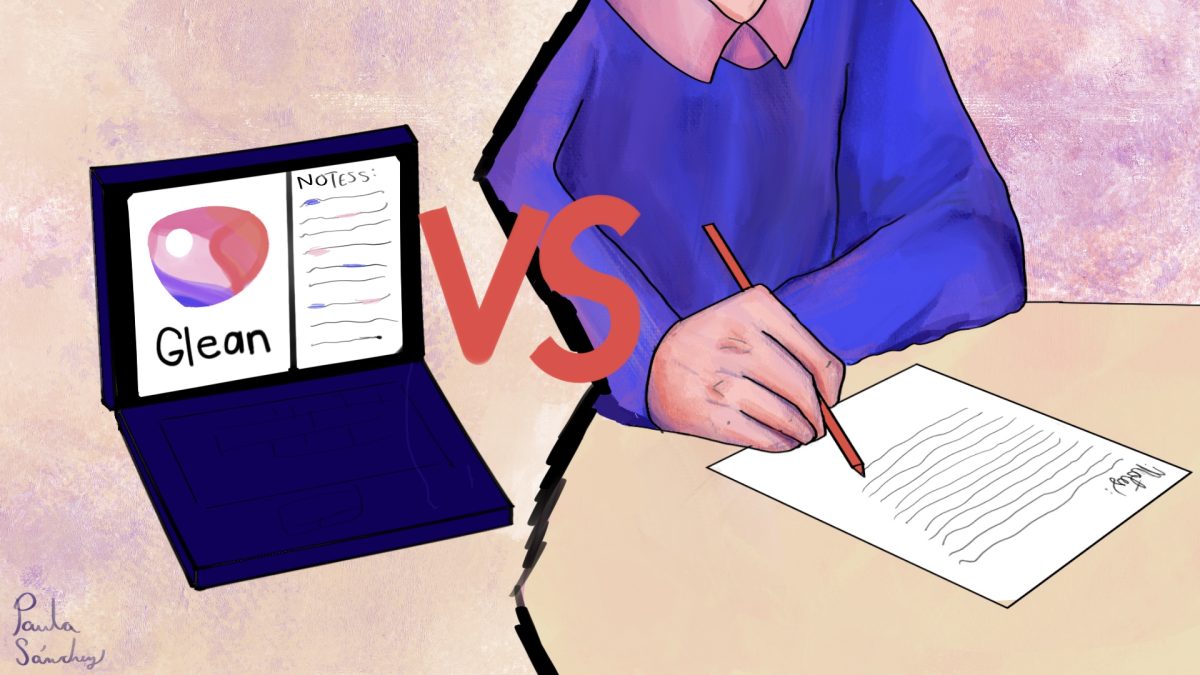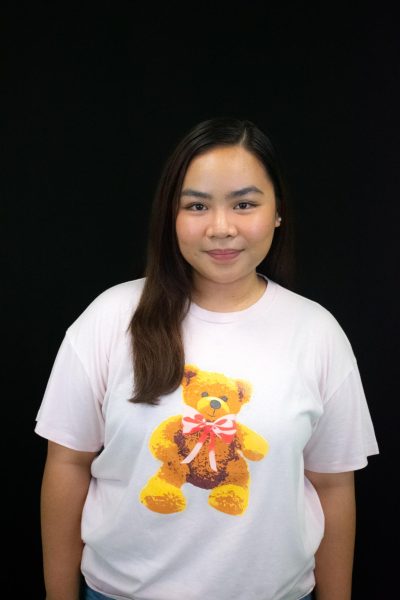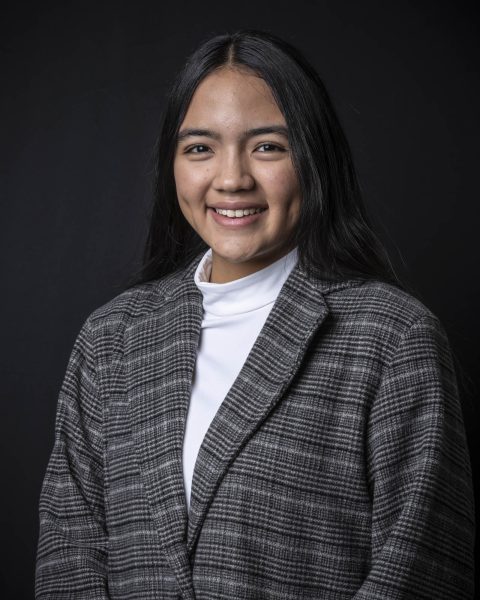For the first time, the Services for Students with Disabilities introduced Glean, a web-based AI tool that records, transcribes, and summarizes notes free of charge for students who need it.
The tool, which the college pays a licensing fee to use, replaces peer notetakers who used to volunteer to provide copies of their notes that were then accessed through the MySSD web page. At the end of the semester, the volunteers received a stipend of $100 per class. The system was anonymous.
SSD Director Jeanne Kelly said that peer notetakers were a great system for “anonymity” since neither party knew who was taking the notes nor who was receiving them. But she said the number of students volunteering to take notes had been declining.
“One of the problems was that teachers couldn’t get students to volunteer, and another problem is that students who did volunteer didn’t provide the notes,” she said. “There would also be the question, as always, just what was the quality of those notes? Because we couldn’t oversee that.”
Under the old system, instructors presented a “notetaker request” to the class at the start of the semester to find volunteers. During the second week of classes, SSD confirmed with the student with a disability if they need the notetaker for that particular class.
Kelly said that the transition to Glean was to make sure that students were receiving the accommodation that they needed.
“There are a lot of issues in which we were always concerned about whether or not we were meeting the needs of that accommodation,” Kelly said.
Now, students who need note taking support can simply log into Glean using their Columbia sign-on. Glean allows the student to record, annotate and use live captioning. It also provides a transcript of the recording and can create a summary from that.
Students also don’t have to record and listen back to the entire lecture now, which is what happened in the past if no students volunteered to be a notetaker.
ASL-English Interpretation major Bee Bagley has been requesting notetaking accommodations since their first year in the college.
This semester is the first time they are using Glean for notetaking support.
“When I went to my normal routine of matching accommodations to classes, I saw ‘Peer Notetaker’ had changed to ‘Note-taking Services,’ I panicked for a second, but Columbia couldn’t have taken notetakers, right?” they said. “Later, I got an email that was very cheerful, all sunshine. ‘Welcome, Glean! Our brand-new notetaking service!’ What? I had heard about Glean and didn’t like the sound of it.”
Bagley said that they struggle with getting important information in an organized manner due to dyslexia and Attention Deficit Hyperactivity Disorder.
“This means listening and writing notes simultaneously, where they are legible and organized, is nearly impossible for me,” they said.
Bagley clarified that while they can write organized and clear notes, they cannot do it live.
“Glean seems to solve my problem, but all it does is record and transcribe,” they said. “This means my three-hour class now becomes a minimum of six hours for notetaking alone.”
They also emphasized that compared to Glean, human notetakers can identify a side conversation, what a tangent is and what is on topic.
“We have a hard enough time getting these accommodations to begin with and getting professors and staff to respect them,” they said.
Logan Garcia, a junior illustration major, was previously a peer notetaker for three months at the college. “I’m a good student and take detailed notes so I figured it’d be easy to get paid for the notes I was going to take regardless,” he said.
Garcia, who also is disabled, learned about the rollout of Glean through a post on the Engage app.
He said he worries about how students who are deaf, hard of hearing or who may have auditory processing issues will be able to navigate the notes in the audio format.
“The recordings can’t provide internet links to any websites or other resources mentioned by the professor,” he said. “Having to scrub through an audio recording to find due dates of assignments or the pertinent information you need at that moment sounds like hell.”
Garcia, who works in SSD, said that Columbia should still use peer notetakers and supplement with Glean.
“Solely relying on Glean provides students with much lower quality accommodations and disregards the needs of Columbia’s disabled students,” Garcia said. “I hope Columbia and SSD choose to use Glean in tandem with student notetakers rather than replace them.”
Access to Glean is only provided to students who have a physical, mental, or learning disability and require note-taking accommodations.
Before being granted access to the tool, the student signs a recording agreement that spells out their responsibilities, how they cannot misuse the material for any purpose, and the consequences.
The Illinois Eavesdropping Act prohibits recording private conversations without the consent of all parties involved. This complicates the use of such tools in an educational setting since discussions are inevitable, which means these recordings can catch all conversations between other students.
But Kelly told the Chronicle that allowing a student with a disability to record a class as an Americans with Disabilities Act accommodation would not violate the Illinois Eavesdropping Act, as long as the student agrees to use the recording solely for their own study and not share it with others.
“This is part of the agreement all students with the notetaking support accommodation must sign to be able to request this accommodation,” she said. “If they do violate the agreement, they are subject to consequences such as loss of the accommodation, disciplinary action under the Student Code of Conduct, and other actions.”
Copy edited by Manuel Nocera
Resumen en Español:
Los Servicios para Estudiantes con Discapacidades (SSD) de Columbia han introducido Glean, una herramienta basada de inteligencia artificial que graba, transcribe y resume las notas de las clases para los estudiantes que necesitan adaptaciones. Esta herramienta reemplaza el sistema anterior en el que voluntarios tomaban notas de manera anónima. Aunque los tomadores de notas voluntarios eran efectivos, su número estaba disminuyendo, y la Directora de SSD, Jeanne Kelly, expresó preocupaciones sobre la fiabilidad y calidad. Glean aborda estos problemas al garantizar que los estudiantes reciban el apoyo necesario, permitiéndoles grabar y anotar las clases, además de ofrecer subtítulos en vivo y resúmenes automáticos.
Aunque Glean mejora la accesibilidad, algunos, como el ex voluntario y trabajador de SSD Logan García, están preocupados por sus limitaciones. García, quien también tiene una discapacidad, señala que los estudiantes con dificultades de procesamiento auditivo podrían tener problemas con el formato de audio de Glean, y que los tomadores de notas voluntarios deberían complementar la herramienta para mejorar la calidad de las adaptaciones.
Glean está disponible solo para estudiantes con discapacidades físicas, mentales o de aprendizaje.
Resumen en Español por Doreen Abril Albuerne-Rodriguez
Resumen en Español copia editada por Manuel Nocera










